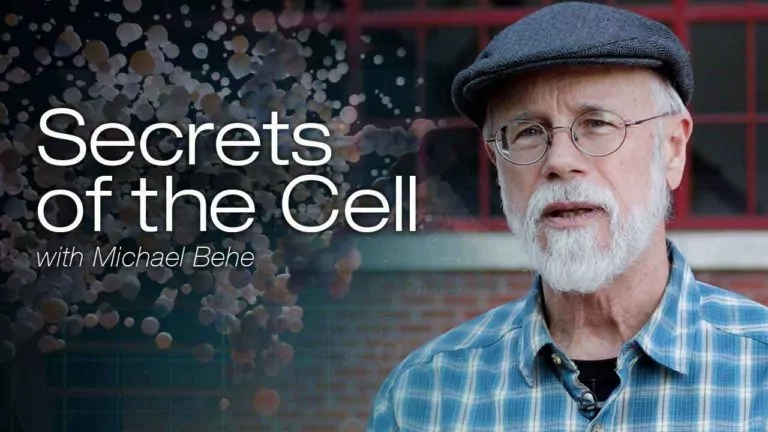When Darwin first published On the Origin of the Species, the science of his time saw the cell as an uncomplicated organism. That’s quite the contrast with what we’ve learned in the 150 years since: the deeper we delve into life on the smallest scale, the more we find there is yet to discover. Even the simplest cells are more intricate than the most complex automated factories.
In the five short videos that follow, Dr. Michael Behe shares “secrets of the cell” to show us how evolution’s random mutation and time simply can’t account for the magnificent design we find even on the cellular level. And in each episode, he uses helpful analogies and computer animations to introduce key Intelligent Design concepts.
Behe is one of the principal figures behind the Intelligent Design (ID) Movement, which argues that Nature gives evidence of being intelligently designed. Creationists would agree, but the two groups part ways on who gets the credit. ID proponents refuse to name their Intelligent Designer, leaving room in their tent for Muslims, Moonies, Christians, and even agnostics (some of whom might believe in thousands of years, and others who hold to millions of years). Meanwhile, creationists give glory specifically to God for how fearfully and wonderfully we have been made.
Thus these ID videos, on their own, don’t bring us to the Truth. However, they do a fantastic job of exposing the evolutionary lie.
SEASON 1
Episode 1: Someone Must Have the Answer! (4 minutes)
In the opening episode, Dr. Michael Behe introduces us to “the unseen world of organic micro-machines” contained inside the “most fundamental unit of life,” the cell. He also shares how he first came to question the explanatory power of Darwin’s Theory:
“My own view of the cell took a turn years ago. I was in a lab at the National Institutes of Health doing postdoctoral research; I was discussing the origin of life with a fellow postdoc. As she and I thought about the cell, we wondered, how could its complex membrane, proteins, metabolism, genetic code, how could all that have formed by the accumulation of undirected changes? So we were both sort of stunned by the notion. But then we just laughed it off. We figured that even if we didn’t know the answer, somebody must know…”
But that isn’t what he found.
Episode 2: The Complexity of Life (5 minutes)
One of the key evidences of Intelligent Design is how some biological “machines” could not have evolved via any sort of step-by-step process – they need all the steps already in place to function. This is what Behe calls “irreducible complexity” and he gives as one example, the flagellum – a type of “outboard motor” that some single-cell bacterium use to move about.
“[It] has a number of parts a driveshaft, a universal joint, a rotor, bushings, stator, even a clutch and braking system. The motor of the flagellum has been clocked at a hundred thousand revolutions per minute and…removing even one component of this elegant machine destroys its function…”
So how could such an irreducibly complex machine have been “developed blindly, in stages”?
Episode 3: The Power of Evolution (6 minutes)
Behe begins with how bugs are amazing, and far more intricate than anything Man can engineer. In fact, there is a whole field of science called biomimetics, or biomimicry devoted to improving human designs by studying bug and animal mechanisms that are “both precise and purposeful.” Did you know that one bug even comes complete with gears?!?
Behe talks about mutation and natural selection, and because these are key elements of Darwin’s Theory, Christians sometimes make the mistake of thinking we must oppose and deny their impact. But the way to figure out the truth isn’t simply to hold to a position 180-degrees from that of mainstream science – evolutionists can’t be trusted to be that reliably wrong.
The key difference between evolution and creation is not in whether mutation and natural selection happen, but rather in what they can accomplish. Evolutionists say mutation and natural selection can, together, create wholly new species, accidentally. We argue that the changes possible are of a more minor sort, and the potential for them is largely built-in, or the changes come about as a result of mutations causing information loss, which would be better called devolution.
Episode 4: Effects of Mutation (7 minutes)
Richard Lenski’s 30-year long E coli bacteria experiment is one of the most popular, and seemingly best examples of evolution observably happening. Mutations had helped the offspring grow faster, and grow bigger than their ancestors.
But what sort of mutations were these? It turned out that they involved broken genes. Thus this was, once again, devolution and did nothing to explain the growth in complexity that would be needed to take us from the simple first molecules to the awesome creature that is Man.
But how does breaking genes help a cell grow faster? Behe notes that just as jettisoning key car parts – maybe the doors, most of the seats, the hood, and cigarette lighter – might allow it to run further on a tank of gas, so, too, some broken genes can increase a cell’s ability to reproduce in a given environment…but only at the expense of the complexity it might need to deal with other circumstances. As Behe puts it, such
“…helpful mutations are not a DNA upgrade.”
Episode 5: The X Factor in Life (8 minutes)
In this conclusion, Behe invites us – challenges us! – to follow where the evidence takes us. This is where Behe gives his most overt pitch for an Intelligent Designer, asking “Who is this Mind?” But he then doesn’t answer his question. So we’re left with his conclusion that there is a Mind behind it – an immensely intelligent, but still unnamed, Designer.
Conclusion
For more Michael Behe, be sure to check out his full-length free documentary Revolutionary: Michael Behe and the Mystery of the Molecular Machines, which is both an account of the man, and also a history of the Intelligent Design Movement. The film, and our review, can be found here. You can also watch the first five episodes of the series above – the first “seasons” – re-edited into one half-hour-long video here. And be sure to check out Season 2 of “Secrets of the Cell.”













